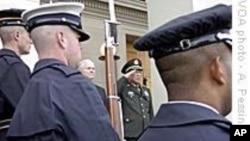U.S. Defense Secretary Robert Gates has urged a senior Chinese military official to work toward a more consistent U.S.-China military relationship, and to stop suspending such ties every time there is a dispute. Gates met Tuesday with one of the vice-chairmen of China's Central Military Commission, General Xu Caihou.
After a brief welcome ceremony outside the Pentagon, Secretary Gates and General Xu met for more than an hour, during which, according to Pentagon Press Secretary Geoff Morrell, the secretary's main message was a call for an end to interruptions in the U.S.-China military relationship. "There is a need to break the on-again-off-again cycle of our military-to-military relationship," he said.
Morrell noted that China has broken off military exchanges several times in recent years, following U.S. arms sales to Taiwan, for example, and he said Secretary Gates wants that to end. China has also been angered by U.S. Naval operations inside its 320-kilometer economic zone, leading to some confrontations between American and Chinese ships. The United States considers the operations legal, but China disagrees. "These are examples of kinds of things that could potentially come up again in the future that the secretary believes we should not allow to derail the progress we are making on a military-to-military basis," he said.
Morrell says such disagreements are all the more reason to have consistent contacts between the U.S. and Chinese military and defense establishments.
The Pentagon spokesman would not specifically quote General Xu's response, but did offer this. "I don't know if he responded to that particular point. There was a general appreciation for the need to continue to build on our military-to-military relationship, and to continue to take advantage of opportunities for cooperation and exchanges," he said.
In a speech on Monday at the Center for Strategic and International Studies in Washington, General Xu pledged "unremitting efforts" to build China's military relationship with the United States, because, he said, it is an important part of one of the most important bi-lateral relationships in the world.
General Xu said the U.S.-China military relationship might have to endure what he called some more "shocks of adversity." But he said China is dedicated to ensuring that the relationship continues.
General Xu also said the U.S.-China military relationship is important to building what he called "strategic trust," as well as practical cooperation, regional stability and world peace. The general said China is in the midst of what he called "a revolution in military affairs." But he said China's sharp increases in military spending in recent years are defensive in nature, and still leave its spending and military capability far behind the United States.
The Pentagon Press Secretary, Geoff Morrell, says at Tuesday's meeting Secretary Gates praised China for increased transparency about its military capabilities and intentions. But Morrell called the effort to convince China to be even more open about such things "a work in progress." He said the two officials agreed that their militaries will conduct a joint "search and rescue" exercise involving naval and air forces, and to resume regular consultations on maritime and other defense issues in December.
Morrell also announced Secretary Gates will make his second visit to China as defense secretary early next year. President Obama is to visit China next month.
A Pentagon release says Gates and Xu also agreed to other high level visits, and to exchanges among lower-ranking service members. The release says they also agreed to work together on issues ranging from Iran, North Korea, Afghanistan and Pakistan to humanitarian assistance projects around the world and the effort to control pandemic disease. The press secretary says the two officials also discussed cooperation in fighting terrorism, piracy, nuclear and missile proliferation and the narcotics trade.
Before leaving the Pentagon, General Xu laid a wreath at the memorial to the 184 people killed in the attack on the building on September 11, 2001.




